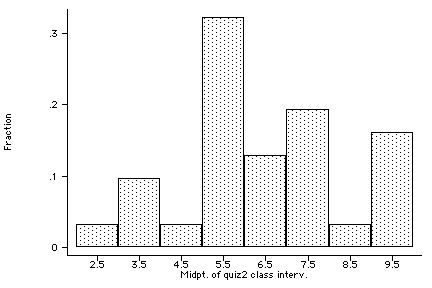
Quiz 2 Results
Quiz was much better this time:
average: 6.9, SD 1.9, median 7

Quiz 2 Solutions
Excerpted from a past L.A. Times:
Headline: Caffeine May Contribute to Infant Deaths
"Pregnant women who drink more than four cups of coffee per day appear more likely to give birth to infants who will succumb to sudden infant death syndrome, according to new research published .. in the Archives of Disease in Childhood."
1) Is this study most likely a controlled study or an observational study? Explain.
An observational study. The treatment group is the group of pregnant women who drink 4 or more cups of coffee per day. The control group is the group of pregnant women that drinks less. As most of you pointed out, it would be unethical, or at least, very difficult, to force people to drink 4 cups of coffee per day during the pregnancy. While I agree it would be particularly unethical to do so with the intent of determining if this was fatal to the soon-to-be-born baby, I should point out that often these studies are not designed to observe disastrous outcomes, but instead note them as a side-effect.
Note that there is a control group, although its existence is implied. You can't say that coffee drinkers are more likely to have SIDS without implying that there exist some non-coffee drinkers. But it is easy to read too much into the above sentence.
2a) Based exclusively on the (admittedly little) information above, can we conclude that if we reduce caffeine intact in pregnant women, we will see a decline in sudden infant death syndrome? Why or why not?
No it's not. The simplest answer is that many uncontrolled-for confounding variables might be the true cause. An example would be that perhaps people with high-stress jobs drink more coffee and the stress might also cause (somehow) a greater tendency for SIDS. Note that it is a fact that more people in the "coffee drinking" group had instances of SIDS than in the non-coffee group. Thus, your example must explain why this is the case and yet coffee is not to blame. Some of you said that "lack of sleep" or "age" might be the causes. And yet,the only way that age could explain this outcome, for example, is if the coffee drinkers were older than the non-coffee drinkers. It is not sufficient to say that SIDS has "many other causes", because then we wonder why the coffee drinkers were more vulnerable to these other causes than the coffee drinkers.
Try to avoid cliches by giving precise explanations. Don't just recapitulate what was said in class: "correlation does not imply causation." I need to see that you understand what this means, and this means you need to explain why in THIS case, that is true.